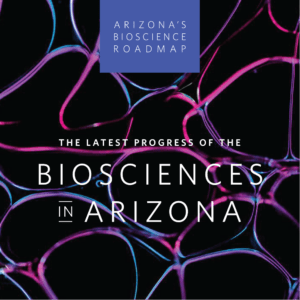
PHOENIX – Arizona’s bioscience sector has continued its sustained advancement over the past two years and established record highs for several performance metrics, at growth rates often outpacing the nation, according to the latest data analysis commissioned by the Flinn Foundation.
Arizona reached record highs in National Institutes of Health funding, bioscience jobs and wages, university research and development, and certain measures of university technology-transfer, as well as an increase in venture capital funding.
Since the launch of Arizona’s Bioscience Roadmap in 2002, performance metrics have been tracked and shared publicly by a third-party consultant. The latest analysis by TEConomy Partners released April 22 is the first since 2022.
“Arizona’s bioscience community—researchers, entrepreneurs, investors, educators, hospitals, companies, and more—has accomplished so much since the beginning of the Roadmap,” said Tammy McLeod, Ph.D., Flinn Foundation president and CEO. “The upward trajectory of metrics like new bioscience jobs and university research shows the power of collaboration across the community. And it illustrates why the Flinn Foundation is intent on renewing the Roadmap, our state’s strategic plan to enhance health outcomes and economic prospects.”
The most recent data show:
Bioscience industry jobs increased by 14.8% between 2020-22 to 39,118, compared to the U.S. average of 11.1% growth. The number of total bioscience jobs, with hospitals factored in, increased 3.8% between 2020-22 to 138,409, slightly outpacing the national growth rate of 3.6%.
The average Arizona bioscience wage of $84,536 in 2022—an 11.5% increase—is 30.7% higher than the average private sector job in the state. For non-hospital bioscience jobs, the average Arizona wage is $99,658, an 8.2% increase over 2020.
In 2023, Arizona institutions received $365 million in NIH grants. This record-high figure has increased 29%—three times the national average—since 2020. Arizona’s percentage of nationwide NIH funding continues to increase as well and is nearing a target of 1.0% of all NIH funding. About three-fourths of the state’s NIH grants go to the state’s three public universities, followed by 20% to Arizona hospitals and research institutions.
Arizona had a dip in venture capital investment in bioscience companies in 2022 to $188 million, but responded in 2023 with an uptick to $272 million, despite the national trend continuing downward.
Arizona’s academic research and development expenditures in 2022 reached a record-high $706 million, a steady increase over $642 million in 2021 and $623 million in 2020.
Steady growth continued at Arizona’s public universities across a series of technology-transfer measures, though the number of university bioscience startups launched during 2022-23 dropped to 29 after reaching a record high during the previous period.
“This data further confirms the growing impact the biosciences have on Arizona’s economy,” said Ryan Helwig, principal and project director at TEConomy Partners. “For more than two decades, the bio sector has grown its allocations of funding for research—which enables new health discoveries and development of products to benefit patients—and has drawn increasing capital investment for startups, while creating high-paying jobs at an extraordinary rate.”
For the first time in its work studying the biosciences in Arizona, TEConomy Partners conducted an analysis on industry job postings in the non-hospital bioscience sector. There were nearly 28,000 new postings by Arizona employers from March 2022 through March 2024, representing 1.2% of total job postings in the state. The U.S. average for bio jobs is 1.7%.
The Roadmap—the longest-running, statewide bioscience strategic plan in the nation—is guided by Arizona’s Bioscience Roadmap Steering Committee, which includes about 125 leaders from the public and private sectors in science, health care, business, academia, and policy.
This will be the final set of biennial data commissioned by the Flinn Foundation before the renewal of Arizona’s Bioscience Roadmap in late 2025.
Learn more:
Current Progress Report
The Latest Progress of the Biosciences in Arizona
Biosciences in Arizona: 2024 Performance Review

